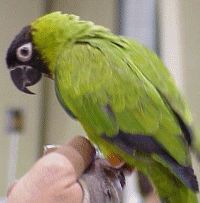So You Want a Pet Bird
Before you run out to your local pet store and yell, “Gimme that African grey,” it is important to understand that parrots are one of the most challenging pets to own. Do your research before you buy a parrot to avoid future health and behavioral problems, and to be sure you get the parrot that best fits your lifestyle and personality. You should realize that some of the larger parrots can easily outlive their owners, with life expectancies of 50 to 80 years. Many will live with you through various moves and changes in lifestyle. The better prepared you are to deal with this long-time companion, the less likely you are to be disappointed and the less likely your pet is to end up on the bird adoption merry-go-round.If a bird’s potential to mimic human speech is your primary criteria when picking a parrot, you might want to think twice about getting one. There is no guarantee that even an African grey parrot, the most skilled talker in the parrot kingdom, will ever say a word. If this is your only reason for having the bird, you may end up disappointed. It is important that you accept the possibility that your bird might never learn to mimic human speech before you decide to buy it. Cost is another consideration. Most of the larger parrots cost hundreds, even thousands, of dollars. This only begins your financial commitment. The cage must be large enough for a bird to flap its wings freely. You will need bird toys, and you will have to replace them regularly. You will be feeding your bird a good pellet mix, seed mix, and a variety of fresh vegetables and fruits. You will have veterinarian visits and grooming costs. Be prepared for emergencies because many birds are prone to accidents and respiratory infections.
And don’t forget noise. Certain species have the potential to scream loudly. The screech of many large parrots is designed to enable flock members to call to each other across miles of jungle. The truth is, you cannot prevent a parrot from ever screaming. Good dominance training and positive reinforcement can reduce most screaming to an acceptable level, but every once and a while the call of the wild will burst forth from your parrot. If you live in an apartment with paper-thin walls, we suggest you get a parrot that cannot drown out your neighbor’s television set. Cockatiels, lovebirds, senegals, red bellies, and African greys, as well as pionus parrots, generally have a reputation for being quieter parrots, the term “quieter” being relative of course. Cockatoos have one of the worst reputations for screaming, largely because they require quite a bit of attention and amusement or they clamor for it loudly. Many of the conures can stun you with their loud screech. Sun, jenday, nanday, and Patagonian conures reportedly are the loudest. Green cheeks, maroon bellies, and painted conures are considered “quiet” conures. Macaws vary greatly in the amount of noise they make.
All parrots require a varied diet with plenty of fresh vegetables and fruits. These will end up on the floor, on the cage bars, and sometimes halfway across the room on the wall. Birds are messy creatures. You will sweep, vacuum, mop, and pick up after them in order to keep their area clean. Frankly, the amount of clean up necessary has been the biggest complaint I have heard from bird owners who are having second thoughts about their pets. If you require your home to be utterly spotless at all times you probably will be driven mad by a pet bird. Parrots also require 10 to 12 hours of sleep each night. This means they need a quiet, dark place during those hours. If the cage is next to a television set that you watch until the wee hours of the morning, you will have a grumpy bird during the day, and eventually the bird will develop some severe behavioral problems. One of the first questions I ask bird owners whose pets have become aggressive is, “How much true sleep time is your bird getting?” Most of these owners have found that behavioral problems decrease dramatically once they make sure their parrot gets a full 10 to 12 hours of undisturbed sleep each night. Finally, you need to have time to properly train your parrot to avoid aggressive behavior and painful bites.
If you are not daunted by any of this information, you might be ready for the responsibility of owning a parrot. They make wonderful pets and their intelligence and humor will delight you for many years to come. Finally, we suggest you read a good book on the particular species you would like to buy before bringing your bird home.










